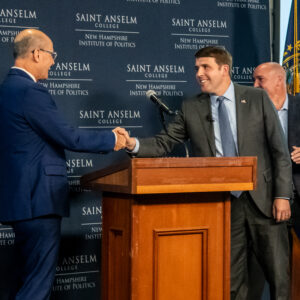First Congressional District voters hoping the race would heat up during Wednesday’s debate went home from the Greater Manchester Chamber of Commerce forum disappointed. Incumbent U.S. Rep. Chris Pappas (D) largely stuck to his well-worn script, touting bipartisanship and moderation, while his Republican challenger, Russell Prescott, maintained his “speak no evil” campaign strategy.
Both candidates used the one-hour event to distance themselves from the more extreme elements in their own parties.
“When I was a state senator, I was a little bit independent, because when things were going wrong in my party, I stood up against it, and I made sure we did things that were right,” Prescott, a former state lawmaker and Executive Council member, said during his closing statement, citing his past opposition to a GOP-backed 2011 voter ID bill.
Pappas, who is seeking a fourth term, sought to create space between himself and an unpopular Democratic president.
“I’m rated as one of the most bipartisan members of the House, number three out of 435 because I firmly believe that the solutions are found somewhere in the middle,” Pappas said. “I was critical of the Biden administration with the plans that they put out for student debt relief because it didn’t solve the problem for future generations, and it also is a kind of bill that should go through Congress and go through regular order.”
In fact, Pappas was awarded a “100 percent Biden Score” from FiveThirtyEight for his voting record during the president’s first term. As for the student debt issue, In May 2023, Pappas voted against a repeal of the Biden administration’s $500 billion college debt bailout plan after first punting on the issue ahead of his successful 2022 reelection.
Wednesday’s debate, moderated by former WMUR Political Director Scott Spradling, kicked off with a question about rising interest rates and an expensive New Hampshire business climate. Prescott immediately referenced a warning he made during his unsuccessful 2022 GOP congressional primary run.
“I mentioned then that if we don’t get serious about balancing our budget, we are going to continue on this same path of high inflation,” he said. “And that’s exactly what happened for the last two years. We did not get serious about balancing our budget.” He pointed to the trillions of dollars in new spending Pappas helped pass.
Pappas pushed back. “Republicans and Democrats have created this problem,” he said.
Prescott also blamed the state’s housing crunch on inflation.
“The reason why we are here is because of inflation, not being fiscally responsible,” he said. “This is the problem and a different way of addressing how we got here is not by issuing more block grants and more spending.
“I’d like to introduce the reality of what has happened in the last four years,” Prescott added. “Building a project goes from $150 per square foot to $300 per square foot because of inflation.
“What we need to do is start balancing our budget to lower the interest rates.”
Pappas said soaring housing prices are “an issue of supply” and added the state “needs to get creative about how we build for the future.”
Prescott, an engineer by trade who currently presides over his family’s water treatment business, took advantage of an oddly worded question from Spradling, who asked how he would “promote and celebrate diversity in Congress.”
“Well, first, I’ll take you up on diversity in Congress,” Prescott said. “We need more engineers in Washington, D.C. with real problem-solving experience.”
Spradling acknowledged he flubbed his question, noting he originally meant to address “diversity as an issue to move through Congress to benefit southern New Hampshire.”
Prescott pivoted to immigration, referencing his support for a “melting pot” vision of America while calling for “working on an immigration process that eliminates illegal immigration.”
Pappas did not mention illegal immigration at all during Wednesday’s debate but said New Hampshire “needs to continue to grow and move in a direction where we’re inclusive of people from all over the world that want to come here and achieve their American Dream.”
Another topic that saw Pappas tread lightly was efforts to bring commuter rail to the Granite State, an $800 million proposal that is supported by Democratic gubernatorial candidate Joyce Craig but has been lambasted by Republicans.
“Ultimately, it’s a decision that has to be made at the state level, but New Hampshire has been embracing this all across the state,” Pappas said. “They want other modes of transportation available, especially as we think about attracting the workforce that we need.”
Prescott said he’s seen the “impact” light rail has had on his native New Hampshire seacoast region and called it “really good.”
Prescott did, however, offer a caveat.
“If rail cannot sustain itself, and it costs more money, and it ends up being something that drives the inflation because we’re spending more money than we have, we need to be very, very fiscally responsible,” he said.
The latest St. Anselm College poll shows Prescott trailing Pappas 50 to 41 percent.





